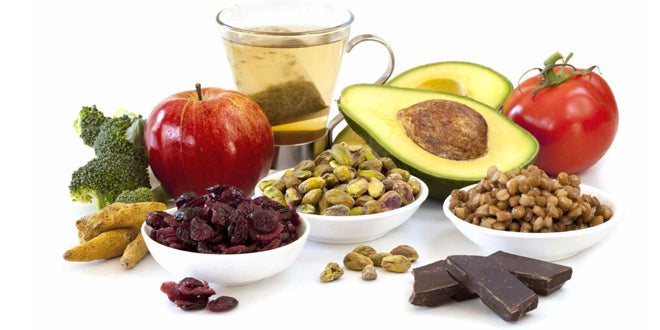High in antioxidants and often in superfoods, healthy fats lead to higher energy levels and help to fortify the body against harmful diseases.
For anyone looking to optimize his or her health, fat has always been a demonized word that many think must be avoided at all costs. With consumption of fatty foods often linked to higher LDL (bad) cholesterol and increased risk of diabetes, heart disease, obesity, cancer and inflammation, and many other health issues, it would make sense—on the surface—to avoid fatty foods. But the fatty foods that lead to health problems are often synthetically processed fats with no nutritional value. While it’s smart to avoid synthetic, processed fats, healthy fats that are found in natural oils, vegetables, and nuts are a necessary part of any proper diet.
To understand what fats lead to the litany of unwanted health issues and what fats can optimize health, it’s vital to understand the fat classifications: trans, saturated, polyunsaturated and monounsaturated fatty acids.
Trans Fatty Acids
Trans fatty acids are liquid vegetable oils that are chemically processed to be semisolid at room temperature. Often called “partially hydrogenated oils,” trans fatty acids are used in margarine, fried food and processed snack food to improve flavor, texture, and shelf-life. Studies have linked these fats to increases in LDL cholesterol and elevated inflammation that can lead to heart disease, diabetes and stroke.
Saturated Fatty Acids
Saturated fatty acids are solid at room temperature. Saturated fats are most commonly found in animal products including red meat, milk, cheese, butter, and some types of vegetable oils (coconut oil, palm kernel, and palm oil). Studies have shown that saturated fatty acids can lead to higher total cholesterol that leans toward higher LDL cholesterol. Additionally, it has been recommended that consumption of saturated fats be kept under 10% of calories per day to lower risk of heart disease.
Polyunsaturated Fatty Acids
Polyunsaturated fatty acids are liquid or soft at room temperature. They are most commonly found in vegetable oils, fish and other seafood. Polyunsaturated fats are high in Omega-3 and Omega-6 fatty acids, which are considered essential fatty acids because they can only be obtained through one’s diet. Essential to fight against blood clotting, muscle movement, and inflammation, polyunsaturated fatty acids are used to build cell membranes and protect nerves. Additionally, when saturated fatty acids are replaced by polyunsaturated fatty acids, LDL cholesterol and triglycerides are reduced.
Monounsaturated Fatty Acids
Monounsaturated fatty acids are liquid at room temperature. They are found in olive oil, peanut oil, canola oil, avocados and most nuts. Monounsaturated fats’ health benefits were initially discovered in a study that found lower rates of heart disease in the high-fat diets of Greece and Mediterranean countries. The lower rates of heart disease were attributed to a greater consumption of olive oil (high in monounsaturated fat) compared to the high consumption rates of saturated animal fats in other countries.
Omega-3 Fatty Acids
Omega-3 fatty acids have been directly linked to increased heart health. The polyunsaturated fatty acid that is found most commonly in salmon, trout, tuna, mackerel, sardines, and herring, Omega-3 fatty acids decrease coronary artery disease, protect against irregular heart beats and lower blood pressure levels. Additionally, these fatty acids have been shown to regulate blood clotting and inflammation, which can prevent general heart disease and strokes and can control lupus, eczema and rheumatoid arthritis.
Aside from their heart health benefits, research has shown that Omega-3 fatty acids contribute to increased brain function and emotional wellbeing. They:
- Increase cognitive function
- Prevent and reduce symptoms of depression, ADHD and bipolar disorder
- Protect against memory loss and dementia
- Battle fatigue
- Sharpen memory
- Balance mood swings
Incorporating Healthy Fats Into Your Diet
With most “cheat” meals containing harmful trans and saturated fatty acids, it’s important to find ways to maximize healthy fat consumption while eating delicious foods.
Avocados are a great source of a monounsaturated fat called oleic acid. This fruit that is often incorrectly called a vegetable is an extremely high source of potassium—40% higher than banana. Additionally, avocados are great sources of fiber, and studies have shown that they decrease LDL cholesterol and increase HDL (good) cholesterol. Avocados are also an effective superfood with high levels of disease fighting carotenoids, vitamin K, and vitamin E. Perfect in salads or guacamole, this fruit is a versatile food that can be eaten on its own or paired with a number of dishes.
Dressing salads with olive oil, dipping bread in olive oil, and replacing usual cooking oils with olive oil are a few great ways to mix healthy fats into one’s diet. Like avocados, olive oil is a monounsaturated fat that is high in vitamin K, vitamin E, and antioxidants. Studies have connected the antioxidants in olive oil with lower levels of inflammation, reduced risk of heart disease, lower blood pressure and improved cholesterol numbers.
Instead of reaching for a high trans fat or a processed bag of chips, grab a handful of nuts to get a crunchy snack and consume more healthy fat. Almonds, walnuts and macadamia nuts are excellent sources of vitamin E, fiber, magnesium and plant-based protein. Nuts have also been shown to reduce obesity, prevent heart disease and inhibit type-2 diabetes.
Takeaways
Consuming trans and saturated fatty acids has been shown to put the body at risk of many chronic and life-threatening diseases, but not all fats are created equal. Healthy fats like those found in avocados, olive oil and nuts are vital to fight diseases, energize the body, keep the heart healthy and improve brain function. With a slight dietary adjustment, replacing trans and saturated fats with monounsaturated and polyunsaturated fats is a practical and essential step towards optimal health.





